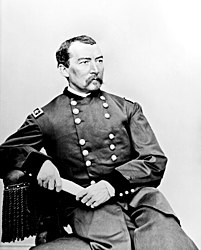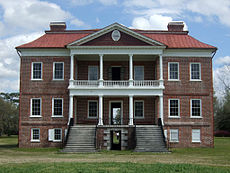Godfred Crovan
His Excellency Godfred Crovan | |
|---|---|
 | |
| 4th President of the Ambrosian Confederal Republic | |
| In office 1 May 1858 – 27 October 1865 | |
| Deputy | James Herbert Ross |
| Preceded by | Henry John Pinckney |
| Succeeded by | James Herbert Ross |
| 1st President of the Confederation of the Kenetcy | |
| In office 2 January 1862 – 27 October 1865 | |
| Preceded by | Position Established |
| Succeeded by | James Herbert Ross |
| Personal details | |
| Born | 6 April 1827 Kilstrand, Caerbannock, Ambrose |
| Died | October 27, 1865 (aged 38) Svanendal, Viceroyality of Alfheim, Sjealand |
| Nationality | Ambrosian |
| Spouse | Rhiannon Campbell Brown |
| Residence(s) | Executive Mansion, Elsbridge |
| Alma mater | Port Logan Military Academy |
| Military service | |
| Allegiance | |
| Branch/service | Royal Army Confederal Armed Forces |
| Years of service | 1842—1865 |
| Rank | |
| Commands | Ambrosian Confederal Armed Forces |
| Battles/wars | Ambrosian Revolution (WIA) Great War of the North |
John Godfred Crovan was an Ambrosian soldier, political theorist and statesman that, as President of the Ambrosian Confederal Republic, was responsible for leading Ambrose and her allies, known as the Coalition, through the Great War of the North from its outbreak in 1861 to his death on the battlefield in 1865. At the height of the war, his military conquests expanded Ambrose to its largest extent in history, and his legacy, while controversial, is widely accepted as having irreversibly redrawn the map of Nordania.
Born to a mixed-race Caerbannock planter family of Northumbrian descent, in his youth Crovan overcame discrimination to become a skillful equestrian, and, with desires to join the Royal Cavalry, was accepted to the Port Logan Military Academy in 1844. Shortly after his graduation, he participated in the Ambrosian Revolution, where his near-fatal wounding earned him what was intended to be a deathbed promotion from lieutenant to lieutenant colonel. In the 1850s, his prolific political writings, as well as his friendship with prominent Army officers such as eventual-president Henry John Pinckney, helped the young Crovan to rapidly rise to brigadier and become appointed to the Ambrosian General Staff in 1856. Pinckney's resignation from the presidency on health grounds allowed Crovan to take power, initially presenting himself as an interim president until he was able to solidify his power. By 1860, Crovan had stripped the final vestiges of power from the nobility by abolishing the House of Lords, centralizing the government and implementing a system of liberal autocracy; while the House of Burgesses was marginalized and most power was rooted in the Army General Staff, Crovan instituted policies of land reform and infrastructure expansion that increased his popularity and made his removal by rivals in the military unfeasible.
Crovan hoped to expand Ambrose's rapidly-developing industrial power on the world stage; in the decline of the Sjealandian maritime empire, he saw opportunities for new markets and territorial expansion. Through the diplomacy of his Foreign Secretary, Elihu Seymour Conway, he amassed a large coalition of Swastria, Jorland and Lothican, and other states opposed to Sjealandic hegemony. His vocal support of Vestman separatists, which many historians view as a calculated provocation, sparked the Great War of the North in 1861. Invading the Vasturian states, Crovan chose to lead his army from the front and inflicted numerous crushing defeats on the newly-unified Vasturian army, knocking the Most Serene Confederation out of the war by mid-1862. The outbreak of war with Wosrac saw him mastermind a brilliant campaign of manuever that culminated in the near-annihilation of the Wosracan Army at Waris Allandary and the occupation of Mulford in July 1863. The naval actions in the Sea of Njord had led to temporary Ambrosian naval dominance, allowing for the conquest of the Tower Islands and the imposition of a naval blockade on Sjealand. Auregan efforts to break the blockade saw Crovan retaliate with a declaration of war in 1863, however Crovan's tactics of operating without supply lines strained the army's resources in this campaign; after the front slogged down to a stalemate by December 1863, he returned to Ambrose for the first time in three years in early 1864. Briefly campaigning to drum up further support for the war, in March 1864 he returned to the front, this time to lead an ambitious invasion of continental Sjealand. He implemented a scorched earth campaign of total war, and was able to take the cities of Varhaugr and Nordvakt, laying siege to the latter. In the final stages of the siege, he was shot by a Sjealandic sharpshooter, and died the next day, 27 October 1865, of his wounds.
Crovan's legacy is controversial, and historical evaluations have varied widely since his death. Even before his death, he was reviled throughout continental Nordania for his then-unprecedented employment of indiscriminate total war, and in certain countries such as Sjealand and Vasturia, some critics continue to regard him as an amoral and manipulative warmonger. In Ambrose, however, he is largely celebrated as a national hero, credited not only with shaping Ambrose into a great power, but also an an important and energetic modernizer who restored public faith in the republican confederal government. Even today, many Ambrosian political parties and figures espouse Crovanism, derived from the liberal stratocratic tradition that developed during and immediately after his rule. Both sides of the spectrum praise his military leadership, which is widely acknowledged as being unparalleled in his time. Sjealandic historian Thorvald Søndergaard described Crovan:
"...without question, a tactical genius, who won nearly every battle he engaged his army to — an army he led just as he led his country: with a captivating magnetism that inspired even his petty political rivals to follow in his footsteps. It was this magnetism that allowed him to utterly destroy the foundations of Nordania, toppling the remnants of feudalism and imposing a unique mix of social liberalism and military despotism that many despots have tried — and failed — to replicate since. His actions, particularly in 1860 and '61, were that of a strategic visionary, of a pragmatist whose morality was outweighed by a stubborn, obstinate, uncompromising nationalism. For some his name represented a compassionate liberal and social reformer, for some a brilliant military mind and a general who led by example, for some a remorseless, unforgiving angel of death. Today, his name continues to evoke both resolve and fear, both anger and pride, but more than anything, a reverence of the highest degree."
Early life
John Godfred Crovan was born at the Crovan family's ancestral home, Morris Hall, near the town of Kilstrand in the thanedred of Caerbannock, on April 6th, 1827. The Crovans were descended from a long line of Harwicker planters that had become a part of the gentry by the turn of the 19th century. His father, Cotesworth Welles Crovan, was a well known, locally-respected landowner who had previously served in the Royal Army of the Kingdom of Ambrosia, as the Captain of the 11th Highland Battalion, 24th Regiment of Foot. His mother, Priscilla Catherine Crovan (née Eslingdon) was the daughter of a wealthy Northumbrian merchant — intermarriage between Harwickers and Northumbrians was relatively accepted, if not normal, in this region of rural Harwick near the Northumbrian frontier.
The family's finances, though comfortable were not unlimited, and regular crop failures (a regular occurrence at those latitudes) prohibited the family from maintaining a large staff — ruling out the possibility of a governess for the young Crovan children. As such, at the age of 10, Crovan was sent to the St. Anwell the Confessor School in Elsbridge, where his father's cousin served as rector. Later in life, Crovan credited the school with his deep Annwynist faith; however, this contrasts with his behavior, where the druids struggled to control the difficult child. Furthermore, he was the victim of extensive bullying by his peers, largely due to his mixed race heritage — anti-Northumbrian racism was endemic in Elsbridge society and was even encouraged by his teachers — as well as due to his short stature, which led to the nickname "Little Godfry". Despite having professed his intentions to enter the clergy, by the age of 15 Crovan was disillusioned with the idea and instead transferred to the Ipswich Military Academy in 1842.
At Ipswich, Crovan continued to suffer discrimination. However, purportedly after being assigned the position of stable boy, he began to take up riding; by 1844, he had established himself as a talented equestrian, and was accepted on a scholarship into the more prestigious King's Own Military Academy in Port Logan, Rheneas. At Port Logan, he rapidly rose to the top of the class academically, though his altercations with other students as well as his perceived political radicalism made him an unpopular pupil. Crovan sought to purchase a commission as a staff officer in a cavalry regiment (as was the most common method of promotion at the time); however his father's death in 1847 left the family financially insolvent; despite graduating fourth of 326 in the Class of 1848, he left with the commission of a mere first lieutenant.
